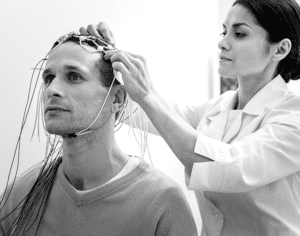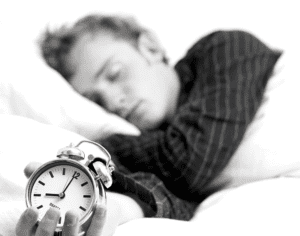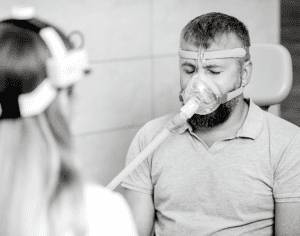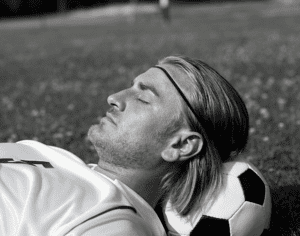I always was told that I snored, it wasn’t a big deal. No one complained because it wasn’t the motorbike that others in the house had. I thought nothing of it. I figured everyone snores, and snoring isn’t a big deal. Sure, it may be a little disruptive, but I in no way thought I had sleep apnea.
So fast forward a couple of years, and I am still being reminded by my girlfriend, my parents, my girlfriend’s parents, and even my sister that I snore. Again I am passing it off as no big deal. It did not bother me because I was waking up with energy and did not have another symptom of sleep apnea, so I just went on with my life. It wasn’t until I was told by those same people that I stopped breathing off and on during my sleep. That was when a red flag went up in my head. I began to worry, but like most people, I ignored it and passed it off as being an allergy to some food product.
This was the first mistake I made; I decided not to deal with the issue at hand and get checked. I let this go on for years until I started getting extremely irritable, lacked motivation, was falling asleep during the day, and getting headaches when I woke up. That was the straw that broke the camels back. It was time for me to deal with the problem, sack up, and go and get a sleep study done.
The Sleep Study

The sleep study is extremely uncomfortable. They put all these electrodes on you, put a cannula under your nose, and strap up your chest. It was possibly one of the worst nights sleeps I have ever had, but nonetheless, I got it done. Fast forward a couple of weeks, and I am diagnosed with severe sleep apnea. The process here in Canada to getting the treatment you need is rather straightforward, but it can take some time.
For me I got an appointment to see the company that supplies the CPAP machines (I will talk about this a little later), and then they gave me this machine and this mask and now I was expected to sleep with this thing blowing wind up my nose throughout the night. Trust me when I say that I got possibly 15 hours of sleep that week. It took me a while just to get used to having something on my face.
Having to breathe forced air and fight against it to exhale was not something that I was going to adapt to quickly. I had to change masks three times before I found the one that worked best for me and once I did… What a difference. A good night’s sleep had been alluding me for almost a decade; I finally understood what it meant to get a good night’s sleep. I will never sleep without the mask again unless my sleep apnea magically disappears.
What Is Sleep Apnea

Sleep apnea is a potentially dangerous sleep disorder that includes the starting and stopping of breathing throughout your sleep cycle. There are two different types of sleep apnea: obstructive sleep apnea, and central sleep apnea. However, for the sake of this article, we will talk specifically about obstructive sleep apnea.
Let me preface all of this with the fact that I am not a medical doctor or a sleep tech. So I am only speaking from what I have been told along with my own experience. Obstructive sleep apnea occurs when the muscles and structures of the throat relax during sleep and collapse in on themselves. This causes a block in the airway. This block in the airway decreases the amount of oxygen getting into the system which signals the brain to wake for a split second for you to get another breath in.
The reason why sleep apnea is so dangerous is that it is linked to many life-threatening health problems such as:
- Diabetes
- Cardiovascular Issues
- Obesity
- Daytime sleepiness (those that drive a vehicle)
- And many other non-life threatening issues.
Who Can Have it

There is a misconception that: only larger people have sleep apnea, only those that smoke, those who live a sedentary lifestyle or drink too often. These are all true in that many of those that are, or do these things are more likely to have sleep apnea, but it is by far not the only people who have it.
The fittest, healthiest individuals can have sleep apnea; even children can have sleep apnea. Many factors of sleep apnea have nothing to do with size or lifestyle. They are structural in nature. You could just have a smaller airway, a pallet that just relaxes too much during sleep, or you could have an enlarged tongue or uvula. The facts are that anyone can have sleep apnea.
When Should You Be Tested

There are many symptoms of sleep apnea some of which you may not even attribute to sleep apnea. For me, I had a few signs that I was aware of. Of course, my partner, parents, and sibling would all tell me that I snore and that I occasionally stopped breathing here and there but it was nothing that I could confirm or deny. So I went on the side of denial and kept on living or so I thought.
It wasn’t until I started developing anxiety, depression, irritability, and daytime sleepiness that I decided that I needed to go get a test done. Now what I am going to argue is that you do not do what I did and be in denial for YEARS. Take action against any symptoms that have to do with sleep apnea.
If someone is telling you that you are stopping breathing in the middle of the night, then you should go and get tested ASAP get the ball rolling because this process is not a quick one and getting on treatment is essential.
Dealing With It

Okay, so you went and got your sleep study done, and you end up getting a diagnosis of sleep apnea. What now? Well, you should be seeing your local equipment supplier, and they will give you a machine, usually a trial. A mask that you may like and some instructions on how to clean it and how to use it. From there you are on your own. I’m warning you not to have your expectations TOO high when it comes to getting used to the CPAP machine.
I read so many stories about people wearing a CPAP mask and waking up the next day like they were a new person. I did not have that experience. Up all night long for the first few nights, and I could have sworn that there was no way I would be able to get used to any of this.
It took me going to youtube to find some support, and I found an excellent channel that helps with all aspects of CPAP usage. The fundamental piece of advice is this, remember you have been sleeping for however old you are now without something attached to your face. Let alone something blowing air up your nose.
Be easy on yourself. Have a little patience and if the mask you have now is not what you expected you can and should try something else. Keep working till you find the mask you are the most comfortable with. Also, make sure the pressure you are using is the correct pressure as well. Keep on experimenting with it until you find the right fit, pressure, and even sleep hygiene. Remember getting treatment for sleep apnea can save your life so do not quit it so quickly.
Conclusion
Sleep apnea is a reality for many people, young and old; it is a debilitating sleep disorder that zaps the energy from those afflicted by it. However, there is good news. There is a way to treat it that takes some getting used to, but it is only far better than getting surgery.
If you are being told by a loved one that you snore or stop breathing while you sleep. Do not go into denial as I did. Seek out your doctor and get yourself on the path to better sleep and a better life at the same time.
Do not allow yourself to be caught up in what the stigma of sleep apnea may be. You are in control of your health no one else. Take command and get yourself on the road to ultimate health!
Athlete Anonymous








